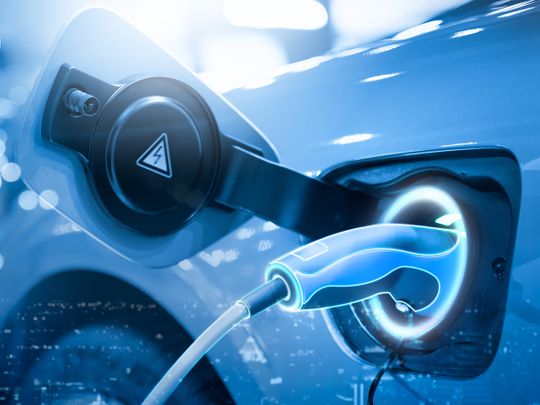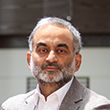
In July, the European Union proposed a ban on the sale of new petrol and diesel vehicles by the start of 2035. The European commission also proposed a 55 per cent reduction in CO2 emissions by 2030.
The European Environment Agency announced in June that in the last 12 months, one in nine cars sold in Europe was an electric or plug-in hybrid vehicle, resulting in a 12 per cent decrease in CO2 emissions from new cars sold compared with 2019.
This year, Klaus Zellmer, Volkswagen board member for sales, told The Muenchner Merkur newspaper that the carmaker intends to stop selling combustion engine cars on the continent by 2035. “In Europe, we will exit the business with internal combustion vehicles between 2033 and 2035, in the United States and China somewhat later,” he said.

The demand for our first battery powered sports car has proven to be a full success not only on a global level but also here in the UAE.
The unquestionable momentum away from internal combustion vehicles is not just limited to the European Union. Dr Manfred Bräunl, Chief Executive Officer at Porsche Middle East & Africa FZE, says that the pattern is also reflected in the Emirates. “The demand for our first battery powered sports car has proven to be a full success not only on a global level but also here in the UAE,” he says. “In the first six months of 2021, we have sold close to 300 Taycan models – a great result for our first electric product. Our accomplishment in such a competitive market underlines that our forward thinking appeals to our customers.”
Bräunl says that Porsche has already committed its future to producing sustainable vehicles but that predictions of the complete demise of the combustion engine may be premature. “With the introduction of our first fully electric sports car, the Taycan, and CO2-neutral production sites in Germany, Porsche has manifested its position as a sustainable manufacturer of luxury sports cars,” he says.

There seems to be a growing appetite for cleaner and greener mobility by our younger customers.
“In addition, we are planning to make a significant contribution to our sustainable strategy by enhancing the classic combustion engine through eFuels. Produced with renewable energy, eFuels can reduce fossil CO2 emissions in combustion engines by up to 90 per cent. So, don’t write off the combustion engine just yet.”
Younger consumers
Syed Faiz Karim, General Manager of Abu Dhabi Motors, says that younger BMW customers in the UAE are often more contentious about the environmental and sustainability credentials. He also says they more inclined to embrace the latest technology. “There seems to be a growing appetite for cleaner and greener mobility by our younger customers. This generation seem to be extremely accepting of new technology, and a result, electrification will play a huge part in Abu Dhabi Motors’ future. However, it is important to mention that the premium experience and impressive performance of a vehicle is still at the top of their list of expectations – something we will always prioritise regardless of the powertrain they opt for.”
He also says that he is already seeing a shift in consumers towards alternatives to traditional combustion engines. “Over the last few years, there has been a noticeable increase in purchase intent for plug in hybrids and electric vehicles, motivated by government incentives and consciousness about sustainability,” he says.

Production for our last new combustion engine model will begin in 2025.
Transitioning to all electric
Carsten Bender, Managing Director, Audi Middle East, says that the brand has set a time frame for its transition to electric vehicles. “Production for our last new combustion engine model will begin in 2025. Its roll-out to international markets will extend into 2026. All other Audi models that will be launched on the global market, starting in 2026, will already be all-electric. We aim to achieve net-zero emissions by 2050 at the latest,” he says.
Bender believes that Audi’s decisive approach to launching electric vehicles is already achieving results, although he says that combustion engines currently remain an important part of the brand. “Our extremely successful Audi e-tron models recorded year-over-year growth of 79.5 percent last year, with 47,324 units delivered to customers. This definitely is a sign of the road we are on, but of course traditional combustion engines are still a big part of our business today.”

Mercedes EQ, home to the EQS and EQA, is pioneering the progressive luxury concept that will soon define the market and cater to the increased demand for EVs in the region.
Mohammad Ghazi Al Momani, the General Manager at Emirates Motor Company (EMC), says that Mercedes have also set a deadline for the electrification of their vehicles. “Mercedes EQ, home to the EQS and EQA, is pioneering the progressive luxury concept that will soon define the market and cater to the increased demand for EVs in the region,” he says. “Recent announcements of the EQE and EQG, expected to debut in the UAE in the next two years, will drive the evolution of EVs in the region. EV versions of these models will enhance their appeal to a new generation of customers and help fuel Mercedes’ ambitions to be electric-only by 2030.”
Momani also says that EMC are also adapting their sales approach to accommodate increasingly digitally savvy consumers. “We are renovating our main showroom in Abu Dhabi in order, creating a digital-first environment to redefine their in-store experience. We also have plans to expand across Abu Dhabi to be closer to our key clients, existing and future customers.”
Maintaining brand heritage
Bender believes that despite the seismic changes within the industry, Audi remains committed to its brand image by sitting at the forefront of innovation and performance. “The biggest and most recent accomplishment of Audi, the e-tron GT, is a firm demonstration of our approach,” he says.
“This car is not only electric, but it is also the most powerful production engine ever built by Audi. With this car, we are saying you don’t have to compromise on performance, luxury or design when you make the switch to an electric vehicle.”
Momani is similarly optimistic about Mercedes’ ability to transition to electric vehicles, without compromising its brand. “Mercedes-Benz’s mission for the coming years is to provide exceptional automobiles that define the luxury market, which will be made even more exciting by the arrival of EV models of the Maybach and G-Class in the near future.”
In the case of Porsche, Bräunl feels strongly that maintaining the iconic brand’s sporting identity is the key to continued success, saying, “We continuously strive for innovations while utilising the knowledge we have gained from building benchmark sports cars for over 70 years to make every Porsche drive and feel like a true Porsche.”







